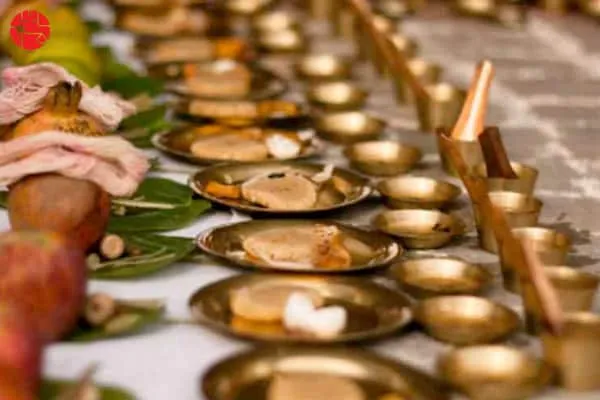Pitru Paksha/Shradh Paksha Dates
Like every year, Ganesha suggests that you pay tribute to your ancestors in Shradh which begins on the Friday, 29, September 2023 and ends on the Tuesday, 03 October 2023.
About The Shradh Paksha
Pitru Paksha, also referred to as Mahalay, is a period of fifteen days. It is the time marked to devote or to offer respect to the deceased souls of loved ones and ancestors of the family. These fifteen days are called the “Pitru Paksha”, or most commonly known as the “Shraddha (श्राद्ध) or Shradh” days. They are also known by the name of “Kanagat.” The dark half of Ashwina (September-October) is observed as Pitru Paksha throughout the Hindu religion.
Shradh Paksha: The Regional Variation
As per the South Indian Amavasyant calendar, Shradh falls in the lunar month of Bhadrapada starting with the full moon day or the day after the full moon day. And as per the North Indian Purnimant calendar, this period falls in the lunar month of Ashwin beginning with the full moon day in Bhadrapada or the next day of the full moon day. It is merely the nomenclature of lunar months that differs. However, both North Indians and South Indians perform Shraddha ritual on similar days.
What Will You Do In Your Life? Get Access To the Premium Junampatri Report.
The Importance Of Shradh Paksha
In the Hindu religion, Shradh marks an important time to perform the ritual of Tarpan, which is a way of remembering, giving thanks and honoring the departed souls of one’s ancestors. This is done by making an offering of their favorite vegetarian food during the Pitru Paksha or Shradh Paksha, which comes right before the Sharad Navratri. It is believed to be a token of respect to the departed souls, who are still considered to be an integral part of Hindu families. Pitru Paksha is considered to be the perfect time to perform the Tarpan rituals. According to the Hindu sacred texts, rituals performed during the Shradh will appease the departed souls. A period of 16 days (Pitru Paksha or Shradh) is dedicated to the ancestors or forefathers each year.
The Legend Behind Shradh Paskah
As per the legend, when the warrior King Karna died during the Mahabharata War and his spirit ascended to heaven, he was offered meals of jewels and gold to eat instead of food. Realizing that he couldn’t sustain himself on these items, he addressed the mighty Lord of heaven, Indra, and asked him why he wasn’t being offered real food. Lord Indra then told him that it was because he gave these items as donations his entire life but never donated food to his ancestors. When Karna further mentioned that he wasn’t aware of the same, Indra agreed to let him return to Earth for a period of fifteen days in order to make amends and donate food in the memory of his ancestors. Thus, this period of time came to be known as Pitru Paksha.
Auspcious Timings To Perform Shradh:
It is always preferred to perform Shradh on the death anniversary of the departed family members, however, if the date is not known, one can perform the rituals on the last day of Pitru Paksha or on the Sarvapitri Amavasya. There are no standard timings to perform Shradh rituals or Tarpan ceremony and it varies from region to region. Thus, one should perform these ceremonies as their local custom and tradition.
Things Not To Do On Shradh Paksha
– It is advisable to not start a new venture.
– One should refrain from buying new clothes or household items.
– One must not perform rituals in the dawn, dusk or evenings.
– Avoid haircuts and shaving.
– Do not eat non-vegetarian food.
– Avoid using iron vessels to prepare or serve food.
– Do not consume alcohol.
What Is Pitru Dosh?
Pitru Dosha is a negative yoga that is created in a Horoscope if Rahu is placed in either the 2nd House, 4th House, 5th House or the 9th House. Due to these placements of Rahu, one may not be able to achieve great success despite having a lot of talent and abilities.
Top 4 Reasons Why You Should Perform Tarpan During Shradh In 2023?
Seek The Blessings Of Your Ancestors
As per the Hindu mythology, devotees believe that our ancestors protect us from the challenges of life and bless us. It is our duty to pay respect and to honor them. If the rituals are performed with honesty, utmost dedication, love and respect, it will appease our ancestors and in turn, they will protect us from all the evil energies of the universe.
Help Your Ancestors Attain Peace
Through the assets and properties of one’s ancestors, one may inherit the ill-effect of their sins. Sometimes, the sins do not allow them to attain peace after death. Pitra Paksha is an occasion to pacify the departed souls by performing Shradh.
Remove The Effects Of Unnatural Or Untimely Death
Unnatural deaths are said to be a big reason for the souls to not attain peace. There is no way to predict death and so, performing Tarpan in Shradh helps remove the effects of unnatural deaths and helps the soul attain divine peace.
Ganesha wishes all a peaceful Shradh.
With Ganesha’s Grace,
GaneshaSpeaks.com
Talk to our Astrologers Get First Consultation Free
